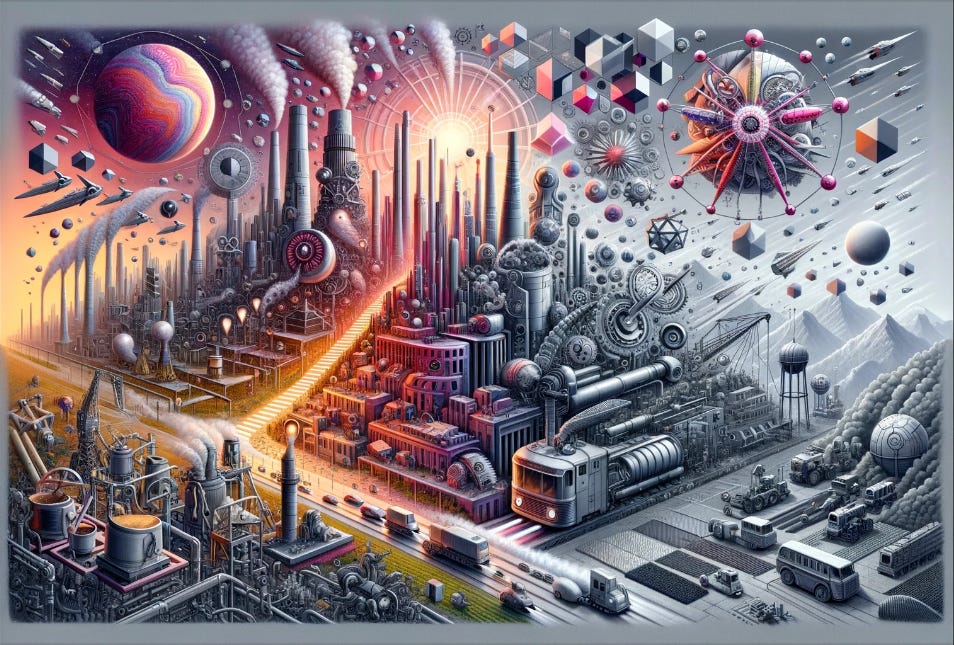HOISTED FROM THE INTERNET OF LONG AGO: Cosma Shalizi (2010): The Singularity in Our Past Light-Cone
<http://bactra.org/weblog/699.html>
The Singularity has happened; we call it "the industrial revolution" or "the long nineteenth century". It was over by the close of 1918:
Exponential yet basically unpredictable growth of technology, rendering long-term extrapolation impossible (even when attempted by geniuses)? Check.
Massive, profoundly dis-orienting transformation in the life of humanity, extending to our ecology, mentality and social organization? Check.
Annihilation of the age-old constraints of space and time? Check.
Embrace of the fusion of humanity and machines? Check.
Creation of vast, inhuman distributed systems of information-processing, communication and control, "the coldest of all cold monsters"? Check; we call them "the self-regulating market system" and "modern bureaucracies" (public or private), and they treat men and women, even those whose minds and bodies instantiate them, like straw dogs.
An implacable drive on the part of those networks to expand, to entrain more and more of the world within their own sphere? Check. ("Drive" is the best I can do; words like "agenda" or "purpose" are too anthropomorphic, and fail to acknowledge the radical novely and strangeness of these assemblages, which are not even intelligent, as we experience intelligence, yet ceaselessly calculating.)
Why, then, since the Singularity is so plainly, even intrusively, visible in our past, does science fiction persist in placing a pale mirage of it in our future? Perhaps: the owl of Minerva flies at dusk; and we are in the late afternoon, fitfully dreaming of the half-glimpsed events of the day, waiting for the stars to come out.
Manual trackback: Gearfuse; Random Walks; Text Patterns; The Daily Dish; The Slack Wire; Making Light (I am not worthy! Also, the Nietzsche quote is perfect); J. S. Bangs; Daily Grail; Crooked Timber; Peter Frase; Blogging the Hugo Winners; The Essence of Mathematics Is Its Freedom; der Augenblick; Monday Evening; The Duck of Minerva (appropriately enough); Long Story, Short Pier ["the owl flies at dusk; it is always dusk; we can no longer tell a black thread from a white"]; Wis[s]e Words; Science Not Fiction; Anniceris; M. John Harrison; Mathbabe; International Studies Quarterly 57 (2013): 637--639 [!]; Brad DeLong; Market Failure; Kellan Sparver
My Comment: Without a doubt, the life of the typical human being did indeed go through a Singularity, although for most of the world, it was sometime after 1918. The shift to today’s world from the illiterate agrarian world, with infant and early childhood mortality at 40%, and most people spending most of their lives seeing the same hundred people in the village—that was a huge transformation.
But can we say the same thing about élite, urban, literate culture? Are the lives of those of us who when young go to places like Harvard after 1950 so qualitatively different from the lives of those who went to Oxford in 1850 or 1550 or 1250, or those who were sent off from Rome to Athens or Rhodes in -100 to gain a little polish, or those who were trained to be scribes under Ramesses II, Sargon of Akkad, or Gilgamesh? And how different was the life of the non-literati élite—those who were not tame accountants, bureaucrats, and propagandists living off of the surplus extracted by the domination-and-exploitation machine that made agrarian-age societies nearly as unequal as possible, but the thugs with spears, specialists in coercive violence, and givers of commands themselves?
Once people learn to read and stories start being told, I see great continuity from Gilgamesh all the way up to Gutenberg. That great continuity in élite material life and mental world does go along with increasing élite wealth, comfort, and sophistication: there are so many more things you can read in 1400 than there were in -2500, after all. There was a four-fold amplification of my H, my crude value of the stock of useful and productive human ideas index.
Was Gutenberg a singularity for the literati? And for the non-literati élite? I need to think about this more. And I need to think about the material and mental worlds of the non-literati élite as well…

